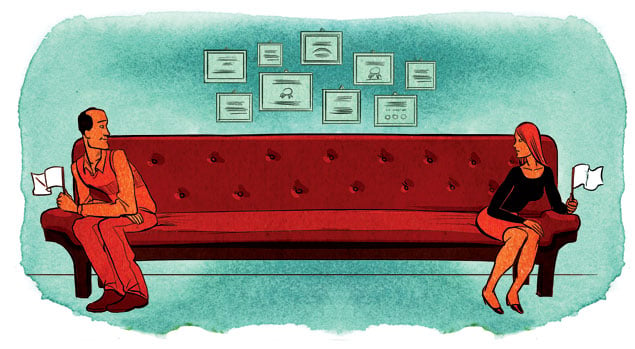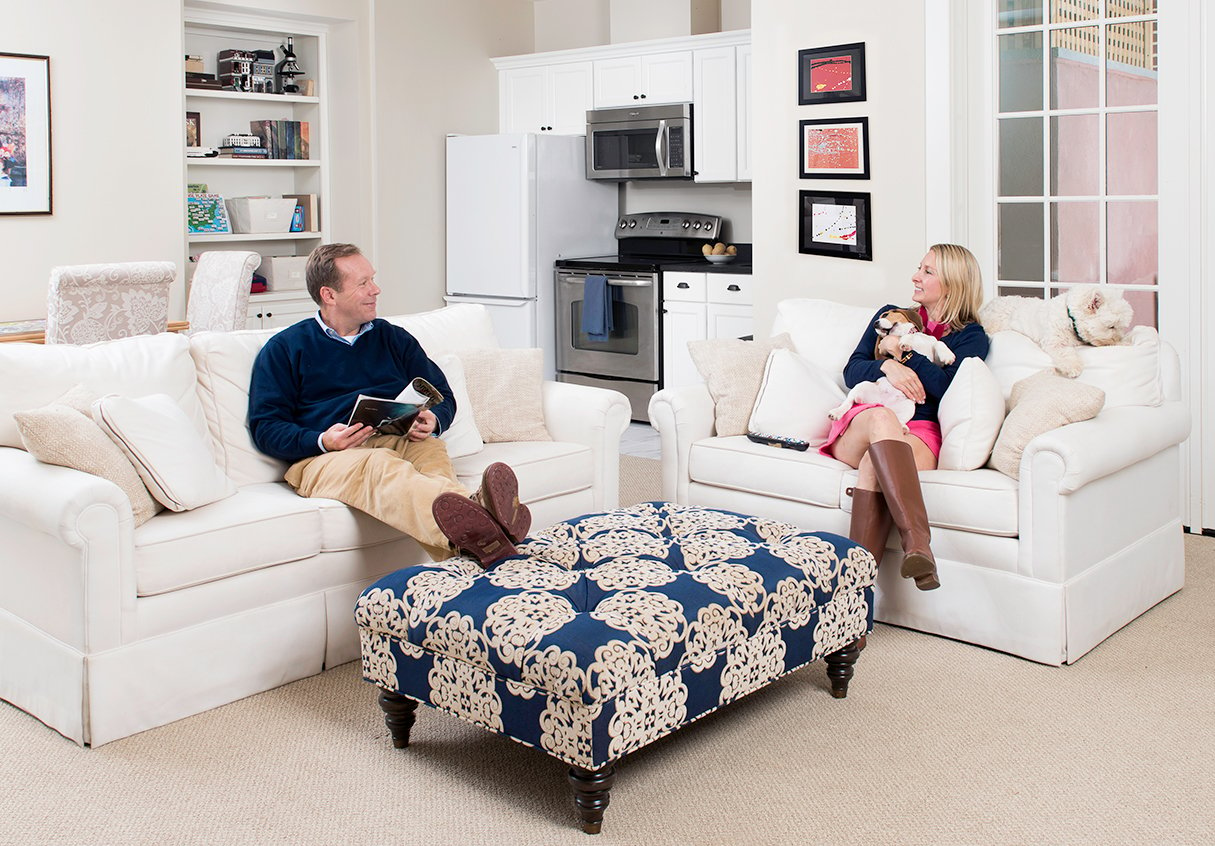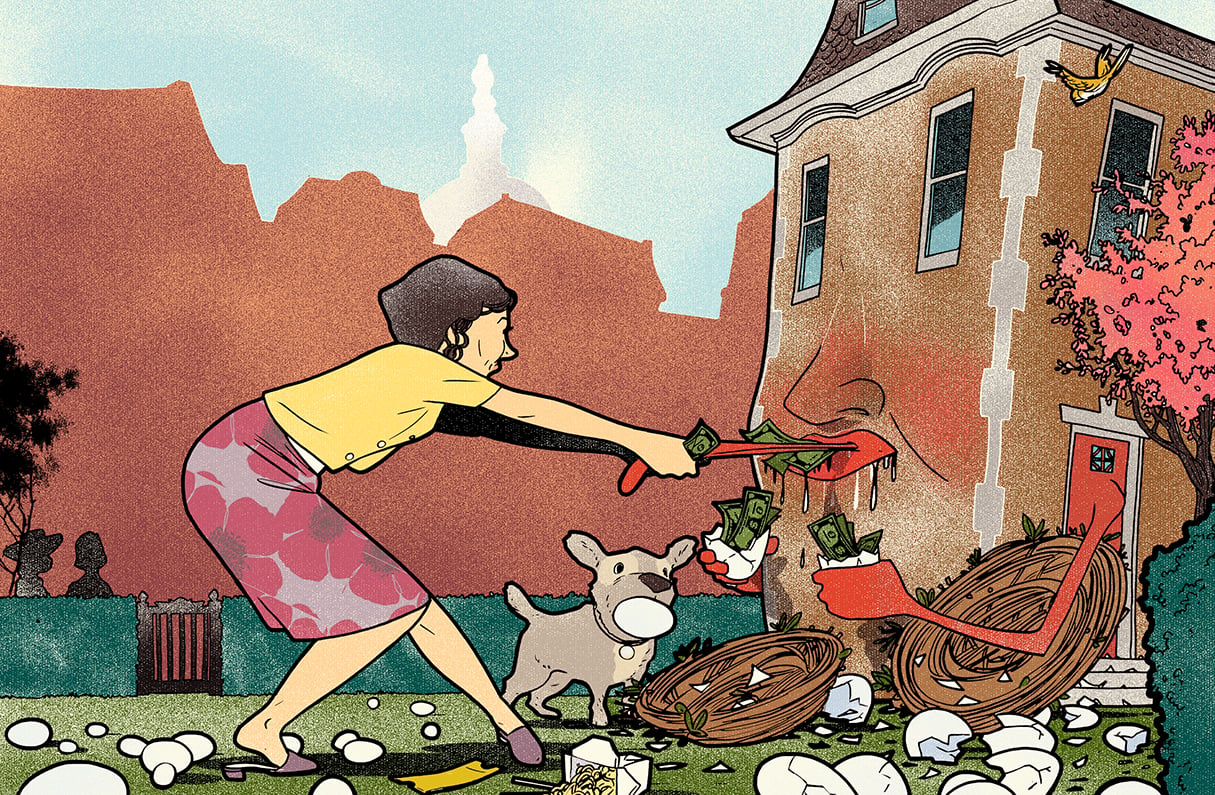I’m constantly surprised by which couples make it and which
don’t.
Some come in with so much damage to their relationship that
it’s pretty unlikely they’re going to make it. But that’s rare. Those
couples usually find their way to a lawyer.
With couples just starting out—in the first ten years or so—it
tends to be more about learning how to live together, how to get along as
housemates, how to talk to each other. They don’t know that they’re not
listening well, that they’re not really hearing the other
person.
With older couples who have been married 15-plus years, midlife
issues are pretty much always in play. As we get to that stage in life,
our psychology shifts toward existential issues: How am I going to leave
my mark, and what do I want for the rest of my life? Couples therapy
becomes an exploration of that. A lot of times, they don’t really know
that that’s fueling the tensions between them. They might be arguing about
what house they want to buy or what vacations to take. Or they might be
having trouble in their sex life—maybe it’s not happening as much. Often
there are affairs or emotional affairs at this time of life.
For some couples, if there’s been an affair, that’s it—it’s a
deal breaker. Other times it becomes a wake-up call. It’s usually
extremely painful, but a lot of couples overcome it, and some overcome
multiple affairs. It’s hard to predict. Some couples, if there’s an
emotional affair, it breaks them.
I’ve had couples where sex is the main thing they’re talking
about, and they’re very open about it—and then others where it virtually
never comes up, and if I do bring it up, it’s clear it’s not going to go
anywhere. A supervisor I had once said, “Sex is probably the one thing in
life that’s a lot easier to do than to talk about.”
• • •
One thing we try to do in therapy is let couples know that
anger is normal. Successful couples learn how to channel that and use it
constructively.
Some actually need help getting angrier with each other. Anger
is part of what fuels passion—you know, we get angry about something
because we care about it. If you’re squelching anger, the relationship can
become passionless. You see that a lot when a couple becomes like friends
and roommates but lose their romantic and sexual feelings for each
other.
On the other side of that coin is the couple that has too much
anger. I’m constantly monitoring the temperature in the room. When a
couple is destructively angry, it’s important that I intervene quickly.
Usually it’s just interrupting and saying, “Hey, cut it out.” I’ll try to
walk them through a better way to say what they’re saying.
Even though I’m a therapist with a lot of experience, I’m a
human being and things affect me. I’m bothered whenever I see couples
mistreating each other. But part of my training is learning when I’m
bothered and getting a consultation if I feel I’m in over my
head.
• • •
Couples therapy is very creative. It’s an exploration. I never
know where it’s going to go.
I had a couple once—they felt so far apart, so different and
distant, and they were both saying they didn’t think they should stay
together. He was very stoic and nonexpressive—kind of the stereotypical
man. She was constantly emoting.
They hadn’t had sex with each other in many years. When I heard
that, I cringed on the inside. I thought, “Oh, wow, this is a really dead
marriage.” It turned out that they’d had a really bad trauma years earlier
and hadn’t talked about it—they’d lost a child. They both were
grief-stricken and became totally polarized. He worked harder; she became
the quintessential homemaker. They’d throw parties. On the outside, they
looked like this great couple, and meanwhile they didn’t talk.
So they came to me years later, and it had gotten to a point
where they were arguing about all kinds of things—how to spend their
money, whether to fix the house, whether to move—and they had no idea what
they were arguing about. They each did a lot of individual therapy as
well, and over the next couple of years they kind of rediscovered each
other.
They had some very painful sessions talking about their loss
and a lot of initially blaming each other. But they started opening up. I
was inspired by what they did. After a couple of years, they started
falling back in love.
If therapy is going well, the two people are going deeper into
themselves individually and they’re learning a lot more about the other
person. To be a party to it and a witness to it is profoundly
gratifying.
Libby Copeland, a former Washington Post reporter, is a writer in New York and a regular contributor to Slate. She can be reached at libbycopeland@gmail.com.



















